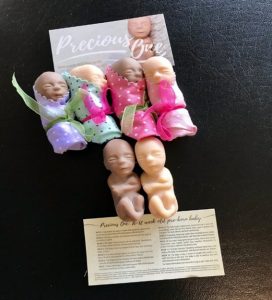By Susan Ciancio
Bad things happen—even to good people. It’s a tragic and often heartbreaking part of life. When they happen, people tend to doubt God—or even His existence—and ask questions such as: Why would God allow this to happen? Where is He? Doesn’t He love me?
But the presence of bad things does not mean the absence of God.
Life is full of blessings—large and small. We see them every day in our home lives, in our jobs, with friends, online, and in the news. It’s easier to answer the above questions when things go well, isn’t it?
During these times we never question why God would allow good things to happen—even though we are sinners.
We never question if God is there. We feel His presence.
We never question His love. We believe in it.
God doesn’t abandon us when bad things happen. He stays right beside us. If we cling to Him, He receives us. If we push Him away, He stands silently to the side, giving us little nudges and hoping we choose to return to Him.
He does this because not only does He love us unconditionally, but because He has given us free will. And, whether you believe it or not, free will is a great gift.
God gave us free will so that we could choose to love Him, so that we could choose to do good, and so that we could choose to care for others while building a culture of life.
As we prepare to celebrate our freedom this Independence Day, let us think about what freedom truly means.
In 1 Peter, we read: “Be free, yet without using freedom as a pretext for evil, but as slaves of God. Give honor to all, love the community, fear God, honor the king.”
Peter is telling us to enjoy the freedoms we have, but he cautions us to not make the choice to use freedom to commit evil acts.
What does freedom as a pretext for evil look like? Well, certainly we are free to abort a baby we don’t want. Our Supreme Court has seen to that. And we are free to allow a sick relative to take his own life. Several states and DC have seen to that with the passing of laws allowing assisted suicide.
Free will also means that we can selfishly do what we want when we want. We are certainly free to hurt others, to steal, to cheat, to lie, and so forth. But this kind of freedom does not equate with goodness and often leads to evil. We are free to do them, but what does that freedom ultimately get us?
Bad things happen because we live in a fallen world—a world full of sinful people. And all too often, people make sinful decisions.
We must understand that every action we take has consequences. Sometimes the consequences are good, sometimes innocuous, and sometimes they’re devastating. Our actions can and do hurt other people.
But, barring a mental illness or a disability that affects our brains, we have the freedom to choose how we treat others, what actions we take, what we say, how we worship, and so forth. We make choices—large and small—many, many times per day.
When we choose wrong over right, when we choose to go against the natural law, when we choose to end the life of a human being, or when we choose any number of other sins that hurt people or ourselves, we take any repercussions upon ourselves. That is called responsibility.
We cannot underestimate the importance of responsibility for our choices in life. These choices will either lead us to or away from God.
Nor can we underestimate the importance of our responsibility for our loved ones and neighbors—especially for the vulnerable. Our actions regarding these people will also either lead us to or away from God.
That’s why it’s so important to teach our children about the sanctity of life from the time they are small. If they grow up understanding that all human beings have value, they are more likely to retain that understanding.
We can use our free will to choose to ignore the threats to human beings. Or we can use our free will to build a culture of life in our homes and communities.
The Culture of Life Studies Program has many great lessons to help build that culture of life. For little ones, we have lessons on compassion for others and on learning about people with disabilities. Plus, we have beautiful fetal models that show children what a 10-12-week-old baby in utero looks like. These are perfect for tiny hands and are tangible reminders of the humanity of a baby who cannot yet be seen by anything other than a sonogram.

For middle and high schoolers, we have a downloadable lesson called Defend Life: The Beauty of the Developing Human Being. This four-class lesson explores the science of the earliest moments of a person’s life and gives students a firm foundation regarding the fact that every human being’s life must be protected from creation until death.
Taking care of others, loving people within our communities, and honoring God is what Peter meant when he taught that we should embrace our freedom.
True freedom lies in understanding that, though we are sinners, we must choose to do good.
So this Independence Day, let us thank God for our freedom. Let us thank a veteran for our freedom, for we know that freedom often comes at a price.
But let us also remember to never squander our freedom. Let us use it to glorify God in all we do, for we must understand that the freedom to do evil comes with a price as well. And that price is our eternal soul.
Image courtesy of Moisés Becerra